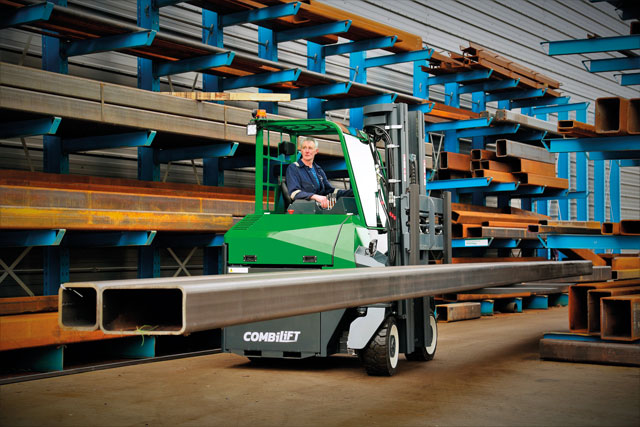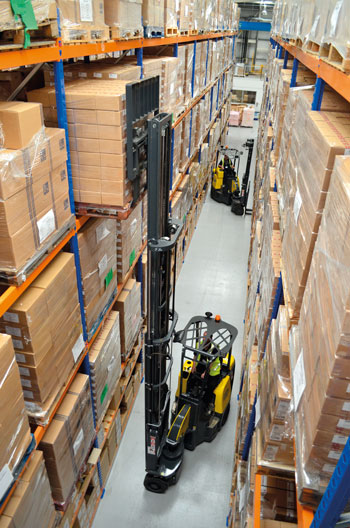
Sustainability is a key corporate driver and measures like making the most of storage space that can reduce carbon footprints as well as potential costs have to be adopted. Anthony Rooney, Product Development Manager, Combilift & Aisle Master, explains how.
Until recently, when companies outgrew their premises or warehousing facilities, the main impediment to upsizing was usually costs. But there is now a more pressing reason to avoid occupying more space than is really necessary – akin to the “improve not move” trend that became prevalent during the pandemic – which is sustainability. Greener, more eco-friendly operation is a real concern for an ever growing number of businesses.
So what to do when you are almost running out of space? If you take a critical look at your warehouse and the equipment used for handling and storing goods, you may well find that some adjustments to the current layout can result in much better utilisation of what is already available. Narrowing down aisle widths and raising the height of pallet racking are just two examples. If the forklifts in use are unsuitable for narrower aisle operation, this may entail looking at other types, such as articulated trucks, which can operate in reduced aisles.

Changing a forklift fleet may initially seem like a daunting step, but it is nowhere near as costly and disruptive as finding, fitting out and relocating operations and personnel in a new, larger site. And if you can keep your physical footprint to a minimum, you are reducing your carbon footprint, as well as overall energy consumption for utilities.
If the forklifts can replace a number of other types of trucks, ROI can be achieved relatively quickly. Aisle Master articulated forklifts for example can replace counterbalance trucks for outdoor offloading and reach trucks for indoor picking and placing. They operate in aisle widths from just 1.6m with lift heights of up to 15m, enabling optimum use of every inch of the warehouse for a potential doubling of storage capacity, whilst reducing the number of trucks needed.
If you deal with long and bulky loads, multidirectional forklifts are the solution for safely and efficiently manoeuvering them in tight areas. Thanks to their ability to travel sideways, aisles and access doors need only be as wide as the depth of the truck, regardless of the length of the load handled. So again; space saved, costs reduced, carbon footprint minimised.
Switching to electric powered equipment is a major step towards improving sustainability, and the demand for electric models is at an all-time high. The traditional “electric inside/ diesel outside” school of thought has changed over the years thanks to improved technological advances in battery power and chargers, and development in forklift design by manufacturers such as Combilift. The company’s electric models, which offer lift capacities of up to 12,000kg are designed for versatile use indoors and out and on less than perfect ground surfaces, unlike many electric trucks which only work on super flat floors.
As electric trucks are much quieter than their LPG or diesel counterparts, noise pollution, which can impact on the health and well-being of people as well as wildlife, is no longer an issue. Drivers, the workforce and visitors on site appreciate the quiet operation, as do neighbouring residents and businesses, particularly in urban areas.
With no engines or transmission in electric trucks, further benefits are reduced maintenance costs and longer service intervals, as there is no longer any need to check and top up fluids, lubricants, coolants or oils.
Transforming your business model into a sustainable one is therefore not as difficult as it may initially appear, and can substantially benefit the environment, your workforce and also your bottom line.
www.combilift.com | info@combilift.com | t: + 353 47 80500

